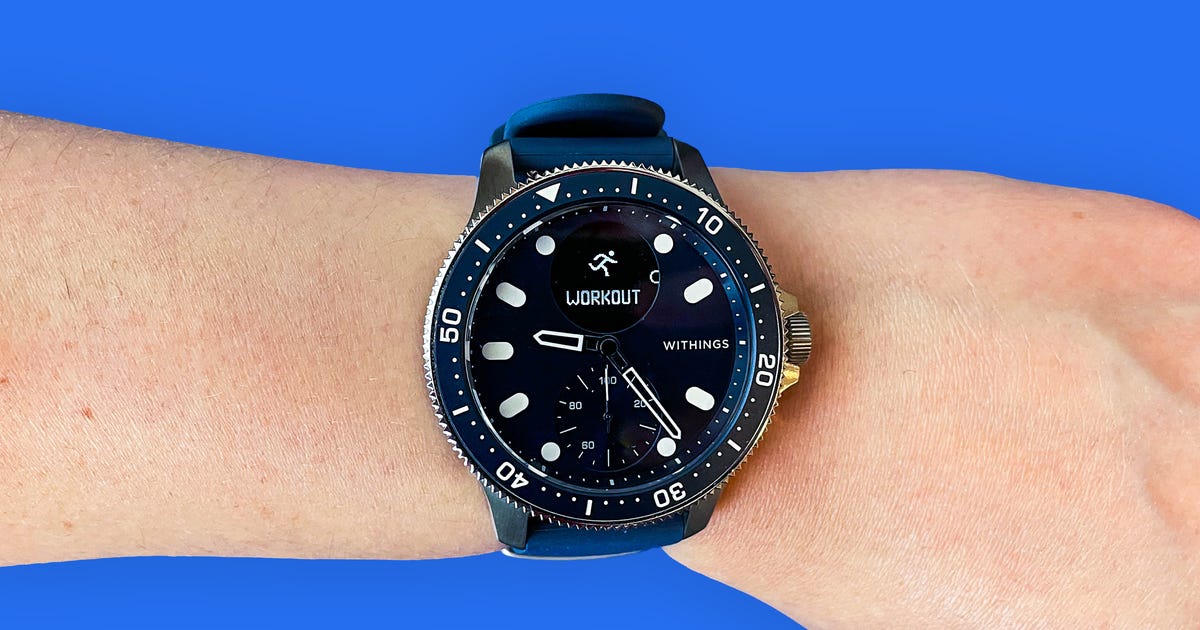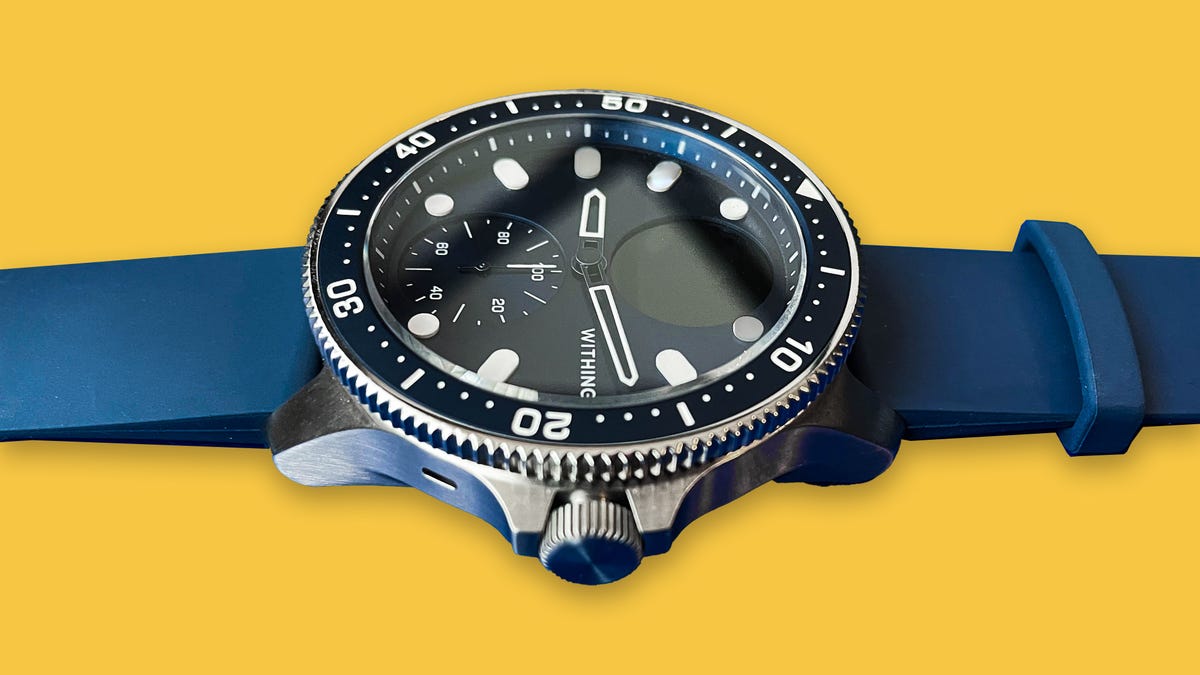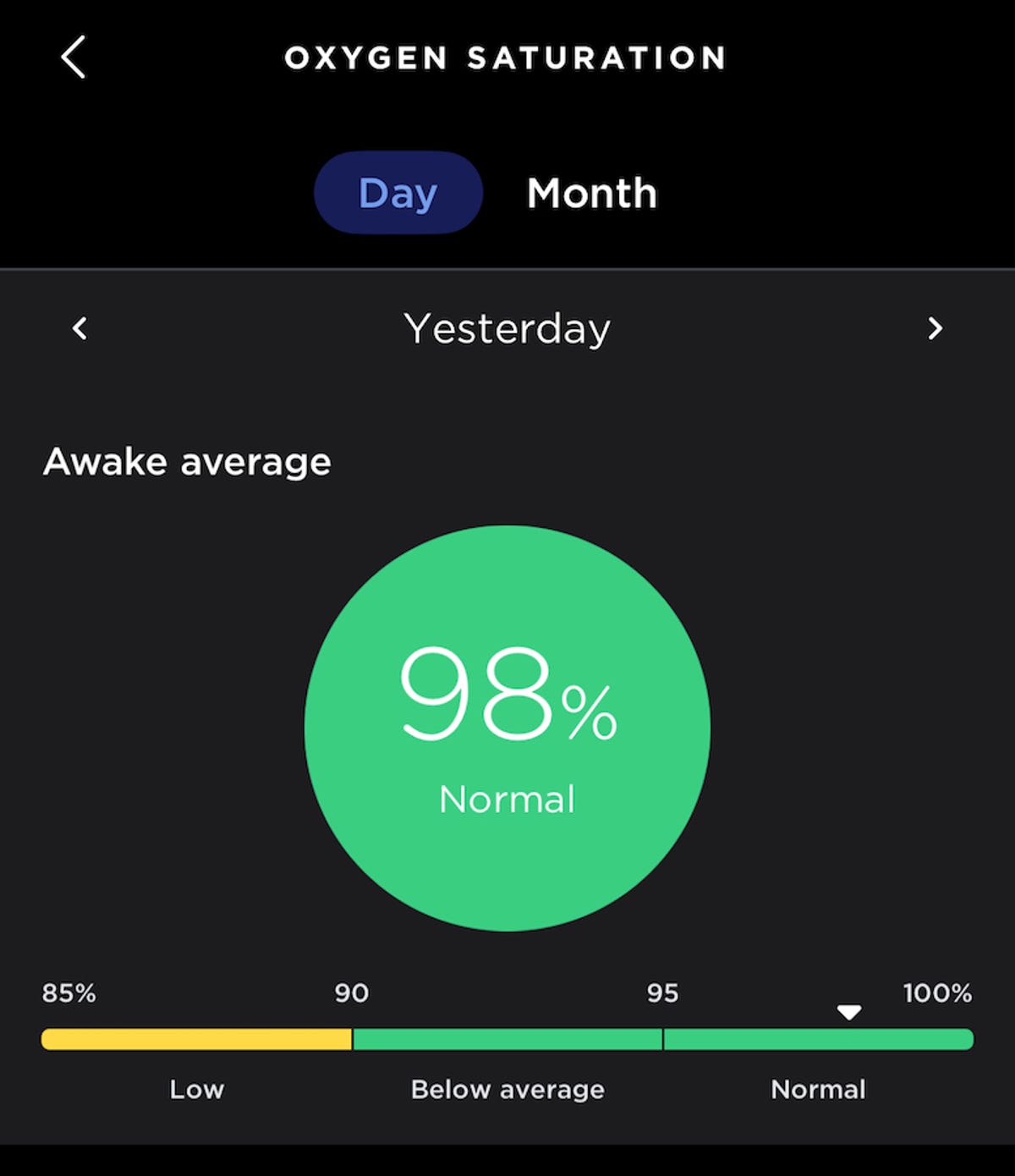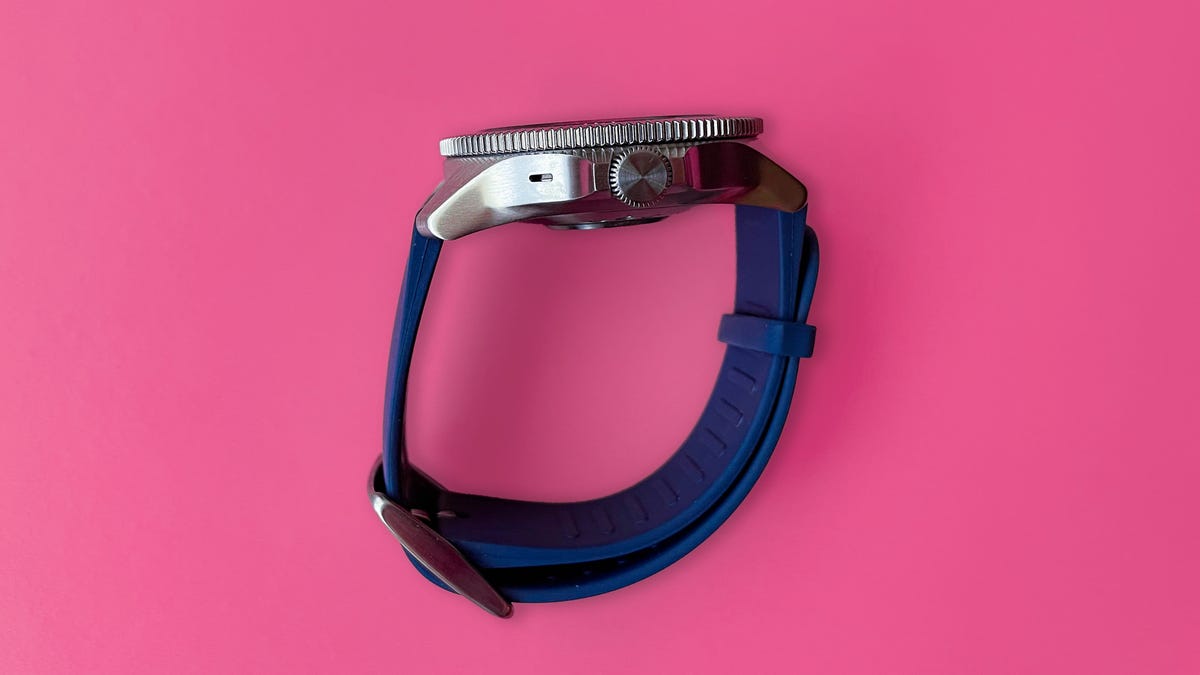Withings scan watch horizon review luxury looks and lots of killing withings scan watch horizon review luxury looks and lots of wavy withings scan watch horizon review luxury looks and lots of aulby withings scan watch horizon review luxury looks and lots more withings scan watch horizon review luxury looks and lots more sign withings scan watch horizon review luxury looks and touches withings scan watch horizon review luxury looks and essence withings scan watch horizon review luxury vinyl withings scanwatch price ces 2020 withings scanwatch for sale withings scanwatch charger

Withings ScanWatch Horizon Review: Luxury Looks and Lots of Health Tracking
There's a lot to like about the Withings ScanWatch Horizon. It looks like a classic dive watch with a stainless steel case and rotating bezel. It has plenty of health features, like an electrocardiogram and blood oxygen tracking, both of which have gained clearance from the US Food and Drug Administration. Apple, Fitbit and Samsung can't say the same about blood oxygen tracking on their own watches. Did I mention Withings claims its battery can last a month?
The question is, whether these qualities make the Withings ScanWatch Horizon worth its $500 price. The answer depends on what you're looking for. Traditional smartwatches are generally easier to navigate thanks to color touchscreens, and they offer more functionality, like mobile payment support, hands-free voice controls and the ability to take calls from your wrist.
The Withings ScanWatch can't do any of these things, but that's on purpose. It's a simpler watch designed to do two things well: look more like a traditional wristwatch and provide in-depth health and wellness tracking. I admire this about the ScanWatch Horizon, but I do think it could benefit from inheriting a few features found on more traditional smartwatches -- namely voice controls.
There are also times when the ScanWatch Horizon's defining characteristics feel at odds with one another. For example, the stylish casing is a large part of the ScanWatch Horizon's appeal, but it feels chunkier and heavier than conventional smartwatches. That means it's not the most comfortable watch to wear while sleeping or working out, despite its wide selection of health features.
Like
- Elegant design
- Plenty of health and activity tracking features
- In-depth health monitoring without a subscription
- Long battery life
- Works with iOS and Android
Don't Like
- Tiny screen can be difficult to navigate
- Feels bulky to wear while sleeping and exercising
- No GPS
- No voice controls for setting alarms and timers
With a classy design, compatibility with iOS and Android, seemingly infinite battery life and in-depth health statistics, the ScanWatch Horizon has a lot going for it. But it feels intended for a specific crowd; those who prefer the look of classic analogue wristwatches and care about little more than health tracking in a wearable.
A smartwatch disguised as a regular timepiece

The Withings ScanWatch Horizon's diving watch-inspired design
Lisa Eadicicco/CNETIt almost doesn't feel right to call the Withings ScanWatch Horizon a smartwatch. Yes, it does smartwatch-like things, such as tracking workouts and displaying alerts from my phone. But it doesn't look the part, and that's a good thing. When a friend asked about it during a recent weekend trip, she was surprised to hear that the watch on my wrist was indeed a smartwatch.
The watch has a stainless steel casing and a rotating bezel with laser engraved markings, while the watch face is covered with scratch-resistant sapphire glass. A tiny circular screen sits near the top of the watch face, surrounded by a dial with hands for the hours and minutes. It's easy to see why it would be mistaken for an analog watch.
That's also evident in the ScanWatch's packaging. Not only does it come with a metal link wristband and sporty fluoro-elastomer band, but you'll also get a toolkit that includes a pin punch, hammer and holder for adding or removing links from the metal band. The watch is compatible with other watch bands that are 20 millimeters in size and have quick-release spring bars. The ScanWatch Horizon's design and packaging are among the few differences that separate it from the standard ScanWatch, which costs $280. Plus, the Horizon model is water resistant down to 100 meters, while the regular ScanWatch is water resistant to 50 meters deep.

The Withings ScanWatch Horizon package contents
Lisa Eadicicco/CNETThe ScanWatch Horizon's looks certainly separate it from similar devices made by tech companies like Apple and Samsung. But this approach isn't new for Withings, and it's not the only watchmaker to specialize in making these so-called hybrid watches that combine analog aesthetics with digital smarts (Garmin makes them, too). I remember being impressed by Withings' Activite fitness tracker from 2014, and the ScanWatch Horizon seems to be the culmination of the company's efforts since then.
While I appreciate the ScanWatch Horizon's elegant design, its 43-millimeter size does feel slightly too large for my wrist. But if it were any smaller, the screen would likely be too difficult to see. The ScanWatch Horizon's tiny round screen is just large enough to view the time, date and workout metrics at a glance, but I wouldn't count on using it for much more than that.
Incoming notifications scroll across the screen like a ticker, which is effective for quickly seeing who's texting you but isn't practical for reading long messages. Most of the time, it's easier to just grab my phone. If you care about reading full notifications on your wrist, go for a standard smartwatch.
Navigating the watch with the digital crown is easy enough, but it's best suited for simple tasks like checking your heart rate or step count. Anything that requires twisting and pushing the digital crown more than twice can feel cumbersome, which is why I wish this smartwatch supported voice controls.
Don't get me wrong; I understand the ScanWatch Horizon isn't designed to do all of the things a typical modern smartwatch can. But if there's one feature I find myself missing most, it's voice recognition. The ScanWatch Horizon's small screen means interactions are limited, making me wish I could just verbally ask the watch to start a workout or set an alarm.
The ScanWatch Horizon goes deep on health and sleep tracking
The Withings app offers a deep dive into various health and wellness metrics including sleep quality, heart rate and blood oxygen saturation levels. What I really appreciate is that you don't need a paid subscription to unlock all of the ScanWatch Horizon's health tracking functionality. That's nice to see, considering brands like Fitbit and Oura have moved toward a subscription-focused model, often locking advanced tracking behind the paywall.

The home screen on Withings' Health Mate app
Screenshot by Lisa Eadicicco/CNETThe level of insight you get is also reasonable, if not impressive. Unlike the $400 Apple Watch Series 7, the ScanWatch Horizon shows how much time you've spent in certain stages of sleep. You also get a sleep score that assesses the overall quality of your sleep, breathing disturbances overnight and your average sleeping heart rate. Fitbit requires a Premium subscription to access a detailed breakdown of your sleep score. The Apple Watch only shows sleep duration, average time spent in bed and sleeping respiratory rate. If you want more data about your sleep, you'll need to download a third-party app for the Apple Watch.
The ScanWatch Horizon's long battery life also gives it an advantage as a sleep tracker. The company claims it can last for 30 days on a single charge. I haven't spent long enough with the ScanWatch to know for sure, but the battery was down to 35% after a little more than a week. That makes me skeptical it will last for a whole month, but it's still impressive compared to most smartwatches.
Battery life also varies depending on how you use the watch. I tend to get a lot of notifications since I turned on Slack and text message alerts, which could be draining the battery faster. Withings offers the option to have the ScanWatch Horizon monitor your blood oxygen levels overnight too, which drains the battery faster. But I didn't have this feature enabled during the first week-and-a-half I spent wearing the watch.
Similar to other high-end watches, the ScanWatch Horizon can take an ECG from your wrist and look for signs of atrial fibrillation. Withings has obtained FDA clearance for this feature, just like Apple, Samsung and Fitbit. But unlike watches from these other companies, the ScanWatch Horizon's blood oxygen sensing tech also has FDA clearance, which Withings says is a testament to the watch's accuracy.
The process of checking your blood oxygen level on the ScanWatch Horizon isn't all that different from doing so on the Apple Watch, but Withings' watch takes longer to do so (30 seconds versus the Apple Watch's 15 seconds). You can take a spot check on the Withings ScanWatch Horizon by choosing SpO2 from the watch's menu, and the company recommends relaxing and resting your arm on a nearby table to get the best results.

Withings logs your blood oxygen measurements in the Health Mate app.
Screenshot by Lisa Eadicicco/CNETThe Withings ScanWatch Horizon and Apple Watch Series 7 sometimes offered similar results, but there was one instance in which the the results differed more noticeably. I took three scans on each watch under the same circumstances at around the same time, but did not compare these results against readings from a traditional standalone pulse oximeter. During the first scan, Withings measured a blood oxygen saturation level of 98% while Apple measured 96%. But the second and third scans were very similar; Withings measured 99% during both scans while the Apple Watch's results were 98% and 99%.
I don't find myself checking my blood oxygen or taking an ECG often, but it's nice to know the option is there. And for those who prefer the look of standard analogue watches that do need to keep a closer eye on their health, the ScanWatch Horizon could be a viable option.
However, I think this metric will be more useful once the companies behind these products figure out the best way to incorporate it into broader features. Withings is doing some of this today by using blood oxygen saturation levels as a metric for detecting breathing disturbances overnight, along with heart rate, breathing rate and movement. The more companies come up with features like this, the more useful blood oxygen sensors will be.
But keep in mind that even though the ScanWatch's blood oxygen and ECG monitoring features are FDA-cleared, it's not meant to be used for making a medical diagnosis. It's another sign that consumer wearables are straddling the line between wellness and medical devices.
Plenty of exercise options, but not suited to workout wear

The Withings ScanWatch Horizon is stylish, but it can feel clunky to wear during a workout.
Lisa Eadicicco/CNETLike many smartwatches and fitness trackers, the ScanWatch Horizon tracks many types of exercise -- from standard options like running and cycling to niche activities such as ping pong, ice hockey and windsurfing. I counted 40 options total, although I was disappointed that HIIT (high intensity interval training) wasn't among them.
ScanWatch Horizon lacks GPS, meaning you'll have to rely on your phone's GPS signal during outdoor runs. I'm more of an indoor runner so this wasn't an issue for me, but it does feel like a strange omission for such a health-oriented watch at this price.
My main criticism of using the ScanWatch Horizon as a fitness tracker comes down to its design. Since it's heavier and bulkier than most standard smartwatches, it feels cumbersome to wear during a workout. The same goes for sleeping with the ScanWatch.
Since you need to use the digital crown to navigate the watch's screen, it can also be difficult to start a workout quickly. Doing so usually requires me to wake the watch (either by turning my wrist or pushing the crown), scroll five or six times to reach the workout option, and then cycle through the workout options to find the exercise I want. That's not so bad if I'm at the gym, but it's hard to spontaneously start a workout when taking a walk.
An optional shortcut lets you jump straight to the workout screen by long pressing the digital crown, but the ability to use voice commands would still be faster and more convenient.
The good news is that it's easy to check your statistics and workouts in the Withings HealthMate app, which syncs with Apple Health among other apps (Google Fit integration is in the works, too). The app's home screen shows your latest workouts, recent health measurements, any health programs you're enrolled in and your sleep and exercise trends. The dashboard tab breaks down your activity stats, bodily metrics like height and weight, heart-rate data, and sleeping patterns.
You can manage settings in the Devices tab, while the Profile section shows any badges you've earned, apps that are connected to your account, reminders and the option to generate a PDF health report that you can share with doctors and relatives.
The bottom line

The Withings ScanWatch Horizon
Lisa Eadicicco/CNETThe $500 Withings ScanWatch Horizon is a stylish watch packed with plenty of health sensors. If you're interested in tracking activity, sleep and metrics related to your cardiac and respiratory health but prefer the look of analogue watches, the ScanWatch Horizon might be the right choice. But keep in mind that the ScanWatch Horizon's luxe looks make it more expensive than your average smartwatch.
And just because the ScanWatch Horizon can track advanced health metrics doesn't necessarily mean it's the best fitness tracker for you. Some people might prefer devices with smaller and lighter designs that are more comfortable to wear while working out or sleeping.
If you're looking for something more like a traditional smartwatch that still goes deep on health monitoring, consider the Garmin Venu 2. It has a stylish design, a touch screen that's larger than the ScanWatch Horizon's display, relatively long battery life for a smartwatch, mobile payment functionality through Garmin Pay and plenty of health features. At $400, it's also $100 cheaper than Withings' latest luxury watch.
But overall, the ScanWatch Horizon achieves its intended goal of looking fashionable while offering a ton of health and wellness statistics. Its long battery life is also a highlight. Just be prepared to sacrifice some convenience since the ScanWatch Horizon lacks certain features that make traditional smartwatches easy to navigate, like voice controls and large touch screens.
Source
Blog Archive
-
▼
2022
(227)
-
▼
December
(88)
- MacOS Ventura: The Coolest Upgrades And New Featur...
- 2023 BMW M2 Prototype First Drive Review: Who Need...
- 5 Grounding Techniques To Manage Anxiety
- All The Free PS4 And PS5 Games PlayStation Plus Su...
- Star Wars Costume Designer John Mollo Dies At 86
- NHTSA Investigating 1.7M Ford, Lincoln Cars Over P...
- Facebook Vs. Apple: Here's What You Need To Know A...
- Bees Get Anxious And Octopuses Feel Pain. Why Do W...
- JCPenney Just Halved The Price On This Jacket For ...
- Scientists Might've Solved The Mystery Of Jupiter'...
- Get $25 Off The New Google Pixel Buds Pro At Amazon
- 5 Unexpected Places To Put Your Apple AirTags
- Netflix's Biggest Hit Movies And Shows, Ranked (Ac...
- WhatsApp Status: Everything You Need To Know About...
- Stylish DIY Pokedex Cover Helps With Pokemon Go Ba...
- Match Launches Stir, A Dating App For Single Parents
- Fauci To Retire As Chief Medical Adviser To Presid...
- Pixel And Moto Phones Are Discounted By Up To 69% ...
- Disney Plus Grows To 137.7M Members After Netflix'...
- Will Diablo II: Resurrected Run On Your Laptop?
- Adobe Lightroom Gets Cinema-style Color Editing To...
- Live-action Blade Runner 2099 Series In The Works ...
- Get 3 Months Of A Tidal HiFi Plus For Less Than Th...
- $10,000 Or $50,000 Student Loan Forgiveness: Could...
- 2023 Nissan Rogue Gets Midnight Edition, Small Pri...
- WhatsApp In Trouble With France Due To Facebook Da...
- Hyundai Confirms Ioniq 5 N Coming In 2023
- Xbox Series X: How Microsoft Learned From Its Mist...
- Win A Shot At An RTX 3080 Ti In Nvidia's System La...
- DJI's New Pro Cinema Camera Looks Funky But Sounds...
- The Absolute Best Anime Shows On Netflix
- Asus ZenFone 3 Review: Too Good For Wallet-watcher...
- Samsung Galaxy S II (U.S. Cellular) Review: Samsun...
- Best Outdoor Grill Deals: Save On Charcoal, Kamado...
- 2022 Zero FXE Review: Here For A Good Time, Not A ...
- Incase's ARC Bag Collection Will Handle Your Tech-...
- Motorola's Back-to-School Sale Knocks Up To $600 O...
- Nvidia Sees A Metaverse Populated With Lifelike Ch...
- Apple TV Plus To Stream 2 Major League Baseball Ga...
- Playing PC Games On Mac Should Get Better With Par...
- Never Forget Your Reading Glasses Again With 30% O...
- How Healthy Is Your Heart? Find Out At Home Withou...
- Withings ScanWatch Horizon Review: Luxury Looks An...
- Selfie Obsessives Will Rejoice At This Dual Front-...
- Celebrate National Waffle Day With Your Very Own W...
- 2023 Kia Sportage Hybrid Pricing Undercuts CR-V, R...
- Mi 11 Ultra Hands-on: Xiaomi Has Truly Outdone Its...
- Amazon Glow Review: A Better Way For Kids To Video...
- Financial Therapy Could Help You Navigate Inflatio...
- This Snapchat Filter Can Help You Learn American S...
- Make Way For Matter, The Smart Home's Would-be Ske...
- WWE 2K21 Game Has Been Canceled, Says WWE
- Pokemon Go Zamazenta Raid Guide: Best Counters, We...
- Best Ways To Use Your Home Equity For Remodeling P...
- PlayStation Plus: Everything You Need To Know As S...
- Vivo V11 Is The Latest Midrange Phone With An In-s...
- Google's 'Premium' Pixel Tablet Is On The Way For ...
- Acer Aspire E1-472G-6844 Review: Better Graphics, ...
- Google's Cheaper Pixel 6A Is Coming Soon, And It L...
- Oppo's R9 Looks Just Like The IPhone 6S (pictures)
- Can Facebook Be Broken Up? What You Need To Know
- Best TV For PS5 And Xbox Series X, Series S For 20...
- ROG Swift 360Hz: Asus Teamed Up With Nvidia To Dev...
- Acer Aspire Vero Eco-friendly Laptop Getting A Spe...
- Facebook Is Testing A Way To Add Multiple Profiles...
- Best Gas Credit Cards For September 2022: Earn Rew...
- Tamagotchi Smartwatch Will Let You Live Your '90s ...
- Bored Kids? Get Them This Indoor Beginner Drone Fo...
- Former Ambassador Sues Apple And Alphabet To Drop ...
- Apple's IOS 15.2 Update: How To Download, New Feat...
- FDA Clears ScanWatch, A Hybrid Smartwatch That Mon...
- Back-to-school Deal: Get An M1 MacBook Air For $80...
- How To Clean Your AirPods The Right Way
- Take To The Skies With $50 Off This Great Beginner...
- Leaked Pics Of Huawei's Updated Freebuds Show Wire...
- Biden Lauds Teslas And Other Electric Vehicles Bei...
- Acer Aspire S 13 Review: An Affordable, Fingerprin...
- 9 Great Reads From CNET This Week: Mojo Lens, T-Mo...
- Snapchat Just Made It Super-easy To Design A Custo...
- LG Display Bolts Curved OLED TVs To Motorized Thro...
- The Best Sci-Fi TV Shows On HBO Max
- Lamborghini's New Urus Performante Ups The SUV Ant...
- People Of The Same Weight Can Look Different Based...
- Galaxy Z Flip 4: The Last-Minute Rumors You Won't ...
- Ronda Rousey, Becky Lynch And Charlotte: Why The W...
- Nvidia GeForce Now Update Brings 1440p At 120fps T...
- Acer Aspire 5735-4624 Review: Acer Aspire 5735-4624
- Mark Zuckerberg Says NFTs Are Coming To Instagram
-
▼
December
(88)
Total Pageviews
Search This Blog
Popular Posts
-
Contoh soalan fizik spm 2019, contoh soalan fizik spm 2018, contoh soalan fizik spm 2017, contoh soalan fizik kertas 3, contoh soalan fizik ...
-
Ukuran tv, ukuran tv 32 inch, ukuran tv 40 inch, ukuran tv 42 inch, ukuran tv 60 inch, ukuran tv 42, ukuran tv lcd, ukuran tv led, ukuran tv...
-
Ukuran sepatu, ukuran sepatu us, ukuran sepatu anak, ukuran sepatu eu, ukuran sepatu eur, ukuran sepatu nike, ukuran sepatu adidas, ukuran s...
